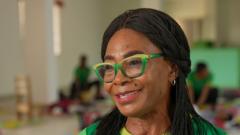Nonye Nweke's Cerebral Palsy Center serves as a beacon of hope, facing challenges in a healthcare system stretched thin.
**A Mother's Crusade: Supporting Nigerians with Cerebral Palsy**

**A Mother's Crusade: Supporting Nigerians with Cerebral Palsy**
A single mother's dedication shines light on neglected care for cerebral palsy in Nigeria.
Despite being just 22 years old, Babatunde Fashola, nicknamed Baba, stands at a mere 70cm (2ft 4in) due to cerebral palsy, a condition that has rendered him unable to walk or speak and dependent on a feeding tube. Abandoned as a baby, he found solace 10 years ago at the Cerebral Palsy Centre in Lagos, Nigeria. “Baba weighs about 12kg [26lb]. He is doing well,” shares Nonye Nweke, the center's founder, during my visit.
Ms. Nweke, supported by her dedicated staff, tirelessly cares for Baba and other children with neurological impairments at the center. The extent of cerebral palsy in Nigeria is significant, with estimates suggesting approximately 700,000 individuals are affected due to issues arising from neonatal jaundice. Professor Chinyere Ezeaka from the Lagos University Teaching Hospital highlights that the lack of immediate treatment for jaundice, common in newborns, can lead to severe, lifelong disabilities.
While treatment is generally effective and involves exposing babies to special UV light, many Nigerian health facilities are ill-equipped to handle cases promptly. Consequently, untreated jaundice is a leading cause of cerebral palsy in the country, which hosts only three privately-operated centers specifically for cerebral palsy amidst its population of over 200 million.
Nweke, a single mother of a 17-year-old daughter named Zimuzo, established the Cerebral Palsy Centre after facing discrimination when seeking daycare support for her child. “When I took her to a day-care, they asked me to take her back because other mothers would withdraw their children. As a mum, I must say it was quite devastating,” she admits.
Currently, the center provides free care for 12 children, a significant feat considering the high costs associated with their care, which totals around $1,000 (£790) monthly—more than a year’s worth of the national minimum wage. There is a dire demand for such facilities, as indicated by the center's long waiting list of over 100 applicants.
Emphasizing the emotional toll of managing such conditions, Nweke reflects on her journey with Zimuzo after taking her in from an orphanage. Initially warned that Zimuzo might not survive beyond two years, Nweke’s commitment and love have led them to celebrate her 17th birthday.
Compounding the difficulties faced by families is the local stigma surrounding disabilities; many children with neurological conditions are subject to harmful beliefs, leading to abandonment or isolation. Nweke's struggle is echoed in the mission of the Oscar Project, an initiative aimed at enhancing the detection and treatment of neonatal jaundice to prevent future cases of cerebral palsy. Launched with the vision of equipping local health facilities and training healthcare personnel, the project hopes to make significant progress within its first year.
Though operating within a challenging public healthcare landscape, both Nweke and the Oscar Project persist in advocating for better awareness, treatment, and care for the victims of cerebral palsy in Nigeria. In the words of Ozcar Project’s Oscar Anderson, “The work doesn't stop until every baby is protected against neonatal jaundice,” echoing a relentless commitment towards fostering healthier outcomes for Nigeria’s most vulnerable infants.
Ms. Nweke, supported by her dedicated staff, tirelessly cares for Baba and other children with neurological impairments at the center. The extent of cerebral palsy in Nigeria is significant, with estimates suggesting approximately 700,000 individuals are affected due to issues arising from neonatal jaundice. Professor Chinyere Ezeaka from the Lagos University Teaching Hospital highlights that the lack of immediate treatment for jaundice, common in newborns, can lead to severe, lifelong disabilities.
While treatment is generally effective and involves exposing babies to special UV light, many Nigerian health facilities are ill-equipped to handle cases promptly. Consequently, untreated jaundice is a leading cause of cerebral palsy in the country, which hosts only three privately-operated centers specifically for cerebral palsy amidst its population of over 200 million.
Nweke, a single mother of a 17-year-old daughter named Zimuzo, established the Cerebral Palsy Centre after facing discrimination when seeking daycare support for her child. “When I took her to a day-care, they asked me to take her back because other mothers would withdraw their children. As a mum, I must say it was quite devastating,” she admits.
Currently, the center provides free care for 12 children, a significant feat considering the high costs associated with their care, which totals around $1,000 (£790) monthly—more than a year’s worth of the national minimum wage. There is a dire demand for such facilities, as indicated by the center's long waiting list of over 100 applicants.
Emphasizing the emotional toll of managing such conditions, Nweke reflects on her journey with Zimuzo after taking her in from an orphanage. Initially warned that Zimuzo might not survive beyond two years, Nweke’s commitment and love have led them to celebrate her 17th birthday.
Compounding the difficulties faced by families is the local stigma surrounding disabilities; many children with neurological conditions are subject to harmful beliefs, leading to abandonment or isolation. Nweke's struggle is echoed in the mission of the Oscar Project, an initiative aimed at enhancing the detection and treatment of neonatal jaundice to prevent future cases of cerebral palsy. Launched with the vision of equipping local health facilities and training healthcare personnel, the project hopes to make significant progress within its first year.
Though operating within a challenging public healthcare landscape, both Nweke and the Oscar Project persist in advocating for better awareness, treatment, and care for the victims of cerebral palsy in Nigeria. In the words of Ozcar Project’s Oscar Anderson, “The work doesn't stop until every baby is protected against neonatal jaundice,” echoing a relentless commitment towards fostering healthier outcomes for Nigeria’s most vulnerable infants.


















